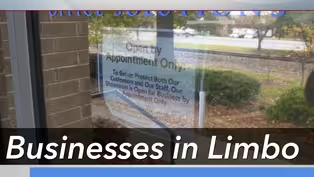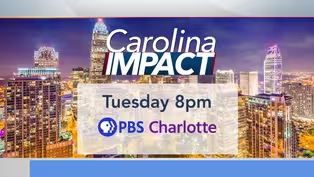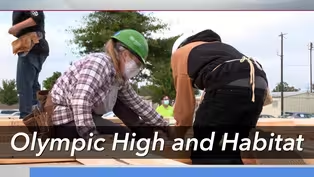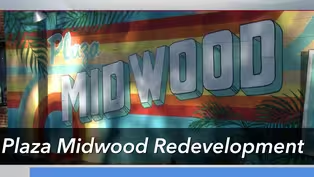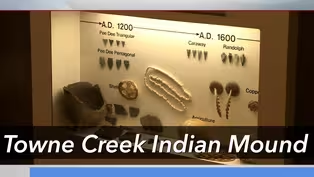
Carolina Impact: January 18, 2021
Season 9 Episode 13 | 25m 41sVideo has Closed Captions
Plaza Midwood development, Habitat and Olympic High, Business in Limbo, Towne Creek Indian
Plaza Midwood development, Habitat Homes and Olympic High, Business in Limbo, Towne Creek Indian mound
Problems playing video? | Closed Captioning Feedback
Problems playing video? | Closed Captioning Feedback
Carolina Impact is a local public television program presented by PBS Charlotte

Carolina Impact: January 18, 2021
Season 9 Episode 13 | 25m 41sVideo has Closed Captions
Plaza Midwood development, Habitat Homes and Olympic High, Business in Limbo, Towne Creek Indian mound
Problems playing video? | Closed Captioning Feedback
How to Watch Carolina Impact
Carolina Impact is available to stream on pbs.org and the free PBS App, available on iPhone, Apple TV, Android TV, Android smartphones, Amazon Fire TV, Amazon Fire Tablet, Roku, Samsung Smart TV, and Vizio.
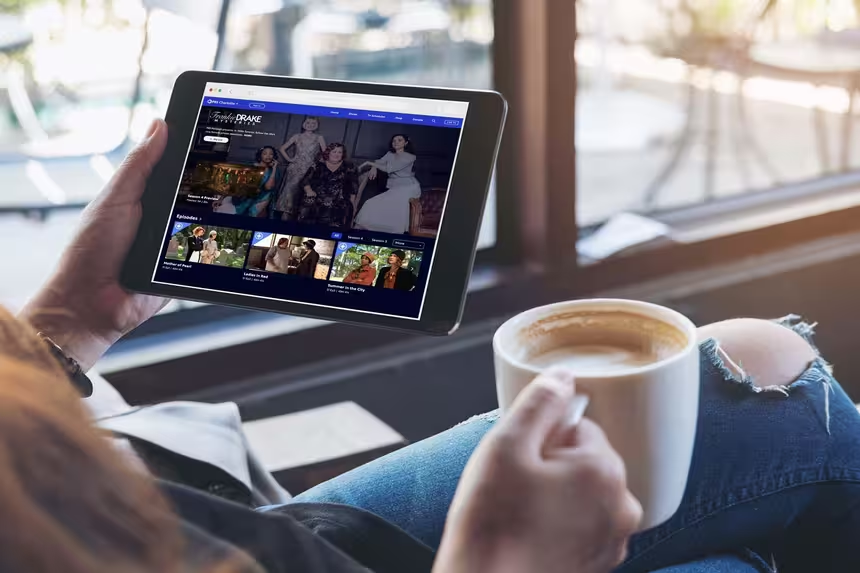
Introducing PBS Charlotte Passport
Now you can stream more of your favorite PBS shows including Masterpiece, NOVA, Nature, Great British Baking Show and many more — online and in the PBS Video app.Providing Support for PBS.org
Learn Moreabout PBS online sponsorship- [Narrator] Wells Fargo is proud to support diversity, equity and inclusion in our employees, our customers and the communities we serve, as well as through content on Carolina Impact.
- [Narrator] This is a production of PBS, Charlotte.
- Just ahead on "Carolina Impact."
- Pandemic limbo.
It's like being stuck in the "Twilight Zone" full of uncertainty for small and medium sized businesses.
We dive deeper into the issue, and how it's impacting people in our region, coming up.
- Building a house and maybe building a career.
I'm Jeff Sonier at Olympic High School where the kids in construction class work side by side with the future owner of this new habitat house.
- [Amy] Plus we'll take you on a One Tank Trip to learn what life was like more than a thousand years ago.
"Carolina Impact" starts right now.
(upbeat music) - [Narrator] "Carolina Impact," covering the issues, people, and places that impact you.
This is "Carolina Impact."
(upbeat music) - Good evening, thanks so much for joining us.
I'm Amy Burkett.
Pandemic uncertainty is keeping Americans in limbo.
According to a new poll from the American Psychological Association, nearly half of the more than 3000 people polled say the pandemic makes planning feel impossible.
One third say they struggle to make basic decisions due to ongoing stress.
Tonight "Carolina Impact's" Rochelle Metzger examines how business owners continue to adapt.
(upbeat music) - [Rochelle] COVID 19 uncertainties taking companies on a recovery rollercoaster ride.
- We're in a crisis.
We're not getting ready to be in a crisis.
We're already in a crisis right now.
- [Rochelle] Business owners are working hard to make headway, but pandemic limbo is threatening to derail their efforts at every turn.
Employers are slowly bringing people back to the office.
Craig Dunn wants to make sure they're set up for success.
- This is kinda how we were able to help people.
"I need eight matching offices."
Well, here we go.
- [Rochelle] Dunn co-owns Carolina Office Solutions in Charlotte.
They sell new and pre-owned furniture to businesses around the region.
- Chairs, chairs are where it's at.
- [Rochelle] And there's plenty to choose from.
Stacks of chairs and rows of cabinets.
Rooms filled with colorful couches and tables, racks stacked to the ceiling with furniture.
But don't let this sprawling warehouse fool you.
Dunn says they've had to drastically downsize during the pandemic.
- We went from 23 on staff down to seven.
Our total revenue is almost cut in half.
- [Rochelle] Dunn says the fear of going broke loomed large.
- You start thinking about your home.
You start thinking about, do I have to mortgage my house to pay bills?
What does the future look like here?
- [Rochelle] Not wanting to worry their families or staff, Dunn says they stayed busy, and used the opportunity to revamp the company.
- Our model changed, which is a positive.
We used to have our front door wide open.
People would walk in.
- [Rochelle] The door is now locked.
And the showroom is open by appointment only.
Before the pandemic, the front area was bustling with salespeople.
Not anymore.
Zoom calls have replaced walk-in traffic.
Dunn says the changes have helped to boost the bottom line.
So much so, he's made several new hires.
- We've hired on three.
So we're up to 10.
Which to a lot of people doesn't seem like a lot, but that's over 30% increase in overhead.
- [Rochelle] But done says the hiring process has been hugely problematic.
- We get people that say they're gonna come in for interviews and don't.
We've had people come in and work for a couple days, "This isn't for me."
Does that happen to every business?
Of course it does, but not as prolifically as it is now.
- [Rochelle] Supply chain issues are another major headache.
- It's horrible, I mean it's bad.
And people really are asking me, "Can you give me a ballpark?"
And I look at them, I say I really can't.
- [Rochelle] But the biggest problem Dunn says is skyrocketing rent prices on Westinghouse Boulevard.
- That's real painful, when that's your biggest overhead.
- [Rochelle] Many employers share his pain, the National Federation of Independent Business Research Center surveyed 600 small business owners in October 2021.
45% said the rise in COVID-19 cases in recent months has had a moderate to large impact on their business.
- In order to stay in the know and stay in the now in small business, you have to be willing to change and you have to be willing to adjust.
- [Rochelle] Larry Swayne is director of the Small Business Center at Central Piedmont.
He says they gave the curriculum a reboot to help business owners navigate through the COVID-19 crisis.
- We are just encouraging them to be fluid and to be nimble because those are the businesses that are gonna survive.
The ones that are able to sort of intuitively listen to the customers, embrace technology, and be willing to pivot.
- [Rochelle] Swayne encourages employers to view this as an opportunity to streamline operations.
He says, "If you feel overwhelmed, take it one day at a time."
Steve Starr knows that feeling.
- There were at least four times during the pandemic where I thought I was done and the company was done.
And that I was gonna have to declare bankruptcy.
- [Rochelle] Starr founded Star Design in 2007, the Charlotte based concept development firm helps emerging restaurants define and design their brand.
If you've eaten at Zo ës Kitchen, Panera Bread, Tupelo Honey, or Firebirds, you've likely seen his work.
- In mid March of 2020, we lost about 65% of our revenue virtually overnight, and it was devastating.
- [Rochelle] Starr was forced to cut his staff of 18 down to seven.
He gave up his dream office, and moved into this coworking space on Wilkinson Boulevard.
- That was heart wrenching.
- [Rochelle] For Starr, Dunn, and so many other business owners, lingering in pandemic limbo is a scary place to be.
- At every step I have to choose faith over fear.
- [Rochelle] Choosing to embrace change, and focusing on the silver lining.
- I'm still standing.
We're still standing and we're thriving.
We're growing again, and that's exciting.
- [Rochelle] A glimmer of hope that healthier times are ahead.
For "Carolina Impact," I'm Rochelle Metzger.
- Thanks, Rochelle.
It's always great to learn more about our business community.
The Small Business Center at Central Piedmont offers free business courses and training seminars as well as no cost one-on-one career counseling with an industry expert.
You can find more information on our website at pbscharlotte.org.
Well, recent census data ranks Charlotte sixth in the nation in overall population growth.
With that growth comes new development, or in many cases redevelopment.
Areas such as South Park and South End are experiencing building booms.
As "Carolina Impact's" Jason Terzis shows us in Plaza Midwood, the push pull of development makes it a little more complicated.
(upbeat music) - [Jason] It's one of the most unique shops in town.
Smack dab in the heart of Plaza Midwood.
- I am still busy.
Is there a number where I can call you back?
- [Jason] Jewelry, Bob Marley gear, patches, all sorts of clothing, Reggae Central carries merchandise you likely won't find anywhere else.
- I opened here in May 31st, 1997.
So, almost 25 years.
- [Jason] It's One of those stores that makes Plaza Midwood well, Plaza Midwood.
- Seemed like this area was the coolest.
(laughs) - [Jason] But also in the store, moving boxes.
Lots of them.
- I'm packing, yes.
- [Jason] Business owner, Carolyn Barber is being forced out by a new building owner who wants to turn the site into a restaurant.
- Not moving by my choice.
- [Jason] Reggae Central is just the latest on a growing list of locally owned small businesses that have either closed up, or relocated, joining the likes of Boris and Natasha, Buffalo Exchange, and even the iconic Central Avenue Dairy Queen.
- Lease rates go up.
And if you're a small business owner and you don't own your building, then there's always the threat that you'll have to eventually relocate.
- [Jason] Over the years, Plaza Midwood developed it's reputation as an eclectic mix of shops, restaurants, people, and art.
- One of the things that I value most about the neighborhood is the architecture and the history.
There's definitely kind of a village type feel.
- [Jason] But it's prime location on the outskirts of uptown have made it a target for developers.
- It's a common theme in every city, right?
Some neighborhoods, cool people move in.
They do innovative, distinct things, and then they make it so viable that people wanna be there.
And you run yourself out of town.
- [Jason] Over the last decade, several mid-rise condos and apartments have popped up.
And now the biggest project to date is breaking ground.
Commonwealth, a 12 acre mixed use multi-building project that will have a little bit of everything.
- We'll have about a hundred thousand square feet of ground floor retail across multiple buildings.
And that's gonna be a mix of local, regional, national tenants, food and beverage, and traditional retail operators.
- [Jason] Located on what has been known as Central Square, Commonwealth will feature a mix of retailers, restaurants, luxury apartments, a boutique hotel, office space, and a pedestrian friendly main street with lots of green space.
- There's obviously a really cool kind of downtown area to Plaza Midwood.
And so, we wanted the feel of the front door of the project to imitate that.
And so, we took the residential that sits on top of that retail and slid it back 20 or 30 feet so that that retail protrudes out and has that kinda main street feel to it.
So, when you look up and down main street, it feels like a continuation of what's already there.
- I was told the same with the building that's around our building.
It was gonna have retail on the bottom, and be more neighborhood friendly and everything.
And let's be realistic.
We know when it comes to the bottom line on these things, they're looking for the most return for their dollar on everything.
- [Jason] Understanding the uniqueness of Plaza Midwood, developers of Crossland Southeast are making efforts to include input from local neighbors.
- You know, a lot of those responses were green space, pedestrian activity, good tenant mix, connectivity with the neighborhood itself.
- Overall, Crossland's been very conscientious of doing the right thing.
For example, they're gonna be preserving two of the historical manufacturing buildings.
- [Jason] The first phase of Commonwealth is slated to open in 2024, phase two in 2026.
Neighbors seem to be split on the plan.
Does it help enhance the community, or hurt it by distracting from some of its distinctive charm?
- Many of the residents feel that it's improvement, it's an improvement over a parking lot, which is a lot of what the space is right now.
- I don't see it as too great for this neighborhood because it won't be a neighborhood anymore.
It won't have character.
- It's just mass development at the expense of people that are already in an area that are adding nothing, but boxes for people to live in.
- No place in Plaza Midwood epitomizes the push pull of redevelopment more than the Thirsty Beaver.
The local dive bar is a staple in the community.
The building has stood here since 1948.
A few years ago, co-owner Brian Wilson resisted all offers for his business.
So, Overtown Row apartments had to alter its plans and build around the beaver.
- We understand how unique our situation is.
That is part of why there's been so much attention.
We were popular even before all this took place.
This only added to it just because of the uniqueness of it.
- [Jason] It's something that's happening in a lot of American cities these days.
Unique neighborhoods drawing interest from developers who see opportunity.
- Because we created this and now we cannot capitalize on what's getting ready to happen, money to be made in this area that we created.
- And so, that's what's kind of sad about continuing development is that we're getting fewer and fewer.
I don't know how long we can be here.
I don't know how long we can afford to be here.
- And for those of us who know the history of Plaza Midwood, then it's just, there are things about this place that are so special that we don't wanna lose, and that some people feel we've already lost.
- [Jason] As the old saying goes, "The only constant in life is change."
And for better or worse, Plaza Midwood is changing.
For Carolina Impact, I'm Jason Terzis reporting.
- Thank you, Jason.
With the recent opening of the City LYNX Gold Line, and long-term plans for the Silver Line.
Access to Plaza Midwood is expected to continue growing.
It's a new year, but the problems we face in 2022 are not so new.
We still need better quality, affordable housing and more of it.
We still need better paying jobs for folks who want to work, but can't find work, and we still need better schools preparing our kids to get those jobs.
Tonight, "Carolina Impact's" Jeff Sonier shows us a program at one local high school doing its part to help solve all three problems, maybe all at once.
Jeff?
- Yeah, it all starts with a simple concrete slab out here on the front lawn of Olympic High School.
But you can see the progress now.
It's a house in progress, a habitat house that will eventually be moved to a neighborhood for a family that doesn't have a house right now.
Also lots of lessons to be learned here.
Starting with giving back to the community, helping those who need help.
Also, hands-on skills for the kids building this house that could turn into a job someday.
And it's also something they can be proud of, that they can point to in the future and say, "Hey, we did this together."
(peaceful music) (hammers banging) That sound of high school hammering.
These teens learning from the pros.
- So, right now it's all the way tight up there.
And I'm hanging over the bottom a little bit so- - [Jeff] The basics of building a house.
- Okay, drive this in.
(hammers banging) - [Jeff] Well, this is exactly how Carly Morris started building a career.
- In high school I took a construction class every year; plumbing, electrical, mechanical, carpentry.
- [Jeff] Now, Carly is a Senior Project Manager at Rodgers Builders.
- Depends on if they wanna take the entire wall off or not.
- [Jeff] Overseeing construction of the new West Charlotte High School.
- We have mechanical set of drawings right here.
So, this is level two and then down on the lower level.
- [Jeff] And that's why Carly's back here at Olympic High School, where she worked on the school's first habitat house as a student back in 2008.
In fact, check out a much younger Carly in these old yearbook photos.
- So honored and shocked that we continue to this day.
- [Jeff] And this whole new story from WBTV.
- [Announcer] She was literally a groundbreaker at the time, breaking the gender barrier in Olympic's Construction Class.
As the first female student project manager.
- I'm not afraid to get on the roof and swing a hammer.
That's where I started.
Those were my roots.
Starting with this habitat house, and working on it.
Remember what you're a part of, it's creating a home for somebody.
- [Jeff] And now Carly wants this latest class of student builders to know that when you build for habitat, you learn construction, but you also learn compassion.
- It's surreal to drive up 12, 13 years later and see that they're a part of the 10th house.
That's huge.
That's 10 families lives that have been affected because these students are choosing to learn, and choosing to contribute to that.
It's not just hammering a nail into a piece of wood, right?
This house is going to be a home for a family.
They're gonna celebrate birthdays, holidays, big milestones.
- [Chevon] Three bedrooms with a Ruby Style's gonna have a washer, pantry, kitchen, of course, one and a half bath.
One story.
Yeah.
Life-changing is an understatement.
- [Jeff] Chevon Faulkner joins the high schoolers, building her habitat house, and shares her stories of not having a house.
- I don't know if any of y'all ever been homeless or like put out your house or not had enough 'cause your parent made the wrong decisions.
I had that too many times.
And then me being the parent, I've done that too many times.
Yeah, with regard to housing versus the income here in Charlotte has been a challenge.
I only have one son and been homeless four times, and I've had corporate jobs.
So, where I live now is subpar, subpar.
I feel very fortunate, very fortunate, especially to have the youth involved in it too.
They're learning and helping.
Can't ask for more than that.
- Your effort here means a lot.
- [Jeff] Carly also reminds these teens that if what they're doing today turns into their career tomorrow.
Well, there's opportunity for everyone.
- We have a massive labor shortage.
We need people in the industry.
So, the opportunities have been great.
I worked for a construction company that's owned by a woman, which I think is really empowering.
Especially working for a female owned company, I have just as much opportunity as my male counterparts.
- At the Olympic Habitat job site, these students learning construction are both male and female, and so are the instructors teaching construction.
- Yep, so go ahead and put that nail all the way in for me.
- I've consistently had a strong woman mentor in the industry since I started.
Building places that heal, or building places where our future leaders are learning.
- [Jeff] And speaking of the future.
Well, this is home video of Carly's four year old at home in the sandbox with her construction toys.
Like mother like daughter?
Well maybe.
- [Carly] what are you building?
- [Daughter] I'm building a high school.
- Maybe she's a builder, maybe she's not.
I don't know.
My grandfather was a brick mason, my uncle's a brick mason, my other uncle builds houses.
It's in my blood, if you will.
And she thinks it's cool, which I think is really cool.
(peaceful music) (hammers banging) - By the way that very first habitat house, the one that Carly helped work on when she was a student here at Olympic.
Well the same family that moved into the house back then still living in the same house today.
Amy?
- Thank you Jeff.
To learn more about Olympic High School's 10th habitat house and their history of helping, head to pbscharlotte.org.
If you're curious about history and what life was like in this region more than a thousand years ago, you might be interested in a trip to Mount Gilead.
A visit offers insight into a rich cultural heritage in this One Tank Trip, reporter Jason Terzis and photo journalist John Branscombe takes us to the Creek Indian Mounds State Historic Site.
(peaceful music) - [Jason] Imagine for a moment you're a farmer, and right in the middle of your field is a rather large mountain of dirt.
- [Megan] Well, in the early 1900's this was cotton fields with a mound in the center.
- [Jason] There was something special about this mound.
It attracted unwanted attention from would be treasure hunters who would trespass on the land.
With the mound in danger, state archeologists stepped in.
- [Megan] They came out, they started the research in 1937.
There was an acre of land that was donated to the state of North Carolina.
and Dr. Joffre Coe, the first archeologists sat out here leading the project.
He carried on that archeological work for decades.
- [Jason] Today, this site encompasses 50 plus acres.
Welcome to the Town Creek Indian Mounds State Historic Site.
- [Rich] We are outside the town of Mount Gilead, which is in the South Central Piedmont of the state.
And we're at a very unique historic site because this is the only one that deals exclusively with American Indian history.
- [Jason] The main attraction here, the mound itself.
- It is a very well engineered pile of dirt.
The people here planned it.
They have it oriented the way that they wanted it to be.
- [Jason] This well-designed pile of dirt actually isn't that unique.
There used to be hundreds of them built across the Southeast and in other parts of the country.
It's a well-preserved example of Mississippian culture.
- People have been here for over 12,000 years.
For most of that time people were hunting and gathering.
But about a thousand years ago they started living here permanently, and practicing this Mississippian cultural tradition.
- [Jason] Allen adds that location was key for the success of this village.
- [Megan] This is a rich resource environment.
So, they're growing corn, there's squash and pumpkins and beans.
So, all of these are being eaten predominantly here in the Southeast.
There's all sorts of wild fruits that people can gather in.
And then the animals that are out here, the deer and the rabbits and the turkeys, and all sorts of other things that people can hunt.
- [Jason] Site manager Rich Thompson says it's hard to estimate how many people actually called Town Creek home.
- It's anybody's guess.
We're at what would have been the equivalent of a county seat or a state capitol of sorts.
This was a political center.
It was a religious center.
It was a place where people met for commerce.
There were artisans that practiced skills here.
It was the center for trade, and it would have been a large population center.
- [Jason] And it was the mound that was at the heart of the village.
- It's a monument.
It's an example of prehistoric monumental work.
And it was built to elevate a particular building, what we refer to as a townhouse.
But that structure serves sort of like your courthouse or legislative building.
And it was also a little bit like a church as well.
- [Jason] Visitors to Town Creek can step inside the reconstructed townhouse and other structures to get a feel for what it might've been like to live here a thousand years ago.
And how the buildings were constructed.
- [Megan] Here with this village site it was round buildings.
And these are constructed with wattle and daub architecture.
So, the wattle is that there's branches that are woven in and out of posts, like making a basket.
And then daub is clay that's packed in on top.
- [Jason] As director of the museum of the Southeast American Indian in Pembroke, Nancy Fields visits Town Creek often.
On this day, she brought a group of teachers from all over the state for a firsthand look at the village.
- [Nancy] So, what we're doing is we are fulfilling a really exciting project.
I brought a group of social studies teachers out to the site and we are gathering content to create a teaching curriculum, a statewide teaching curriculum.
- [Jason] But as a Native American herself, walking into the village is also very personal.
- I think probably one of my favorite parts, even before getting to the stockade, is the pathway that leads into that place.
It is spiritual, and you can't help but feel this very visceral, innate connections to this place.
It's always peaceful.
And I appreciate the solitude and the quiet to really think about and reflect the people that were here.
And honor their memory and kinda be still with them.
- [Jason] According to Thompson, a visit to Town Creek can change perspectives.
- A lot of people will come to the site, and they know that this site deals with American Indians.
And they come in with this idea that these were primitive people.
They lived maybe a backwards life, a hard, unnecessarily hard life.
But when they see this site, and they see the information we have in the museum about what Town Creek was like, it changes their mind.
These folks were sophisticated.
- [Jason] Town Creek Indian Mound connects North Carolinians to a way of life 12,000 years in the making.
And the connection to a much overlooked part of the continent's history.
For Carolina Impact, I'm Jason Terzis reporting.
- I never knew that historic site existed.
Thanks so much, Jason for sharing.
Group activities and self guided tours of the rebuilt structures and mound are available.
That's all the time we have tonight.
We'd love to hear your feedback on tonight's show.
Please email us at feedback@wtvi.org.
We'd also love to learn about your interesting story ideas too.
Thanks so much for joining us.
We always appreciate your time, and we look forward to seeing you back here again.
Next time on "Carolina Impact."
Good night, my friends.
(upbeat music) - [Narrator] A production of PBS Charlotte.
- [Narrator] Wells Fargo is proud to support diversity, equity and inclusion in our employees, our customers and the communities we serve, as well as through content on Carolina Impact.
Businesses in Limbo Due to Covid
Video has Closed Captions
Clip: S9 Ep13 | 5m 22s | Supply chain disruption, labor shortages, and a changing demand for services (5m 22s)
Carolina Impact: January 18, 2021 Preview
Preview: S9 Ep13 | 30s | Carolina Impact: January 18, 2021 Preview (30s)
Olympic High Building Habitat Homes
Video has Closed Captions
Clip: S9 Ep13 | 5m 28s | Local High school students are tackling the affordable housing crisis. (5m 28s)
Video has Closed Captions
Clip: S9 Ep13 | 5m 36s | In Plaza Midwood, the push-pull of development, or in this case, re-development. (5m 36s)
Video has Closed Captions
Clip: S9 Ep13 | 4m 48s | Town Creek Indian Mound State Historic Site in Mt. Gilead (4m 48s)
Providing Support for PBS.org
Learn Moreabout PBS online sponsorshipSupport for PBS provided by:
Carolina Impact is a local public television program presented by PBS Charlotte
